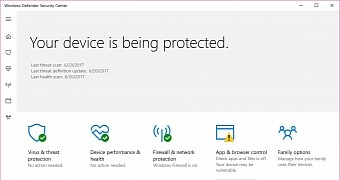Microsoft has finally issued a response to Kaspersky’s EU complaint, after the Russian security vendor requested an antitrust investigation over the way the software giant deals with third-party antivirus in its own Windows operating system.
In a long statement whose role is to defend the Windows 10 antivirus and to explain how Microsoft is working with security vendors on making the operating system play nice with third-party solutions, Rob Lefferts, Partner Director, Windows & Devices Group, Security & Enterprise, explains that Windows Defender is currently one of the top solutions on the market, with over 99 percent detection rates.
“We built Windows Defender Antivirus to make a promise to our customers that every Windows 10 device ALWAYS has protection from viruses and malware. Through our continued investments, our test results are among the top of security industry leaders,” he said.
Lefferts then goes on to point out Microsoft is collaborating with nearly 80 independent software vendors as part of the so-called Microsoft Virus Initiative (MVI) program, which makes it possible for antivirus vendors to prepare for the release of new Windows versions and optimize their solutions to prevent any compatibility issues that might be experienced.
Furthermore, Microsoft says that antivirus companies can also test compatibility with new Windows versions thanks to the Windows Insider program, a program that also involves millions of users who can send feedback on any problem that might arise.
95 percent of antivirus products compatible with Creators Update
Lefferts responds to Kaspersky’s claim that Microsoft disables antivirus software when updating Windows by going back to the Windows 10 Creators Update released on April 11. No less than 95 percent of the Windows 10 PCs getting the update were running antivirus compatible with the Creators Update, Microsoft says.
“For the small number of applications that still needed updating, we built a feature just for AV apps that would prompt the customer to install a new version of their AV app right after the update completed. To do this, we first temporarily disabled some parts of the AV software when the update began. We did this work in partnership with the AV partner to specify which versions of their software are compatible and where to direct customers after updating,” the company exec says.
In the end, Lefferts emphasizes that Microsoft is always working closely with antivirus vendors to make sure not only that no compatibility issues are experienced when updating Windows, but also that users remain protected all the time. This is the reason Windows Defender kicks in when third-party antivirus is removed or expires, Lefferts added, again responding to Kaspersky who claimed that Windows 10 blocks expiring subscription notifications.
Microsoft has been trying to reach out to Kaspersky several times, according to reports, but the Russian security company decided to pursue legal action. The EU is yet to announce whether an antitrust investigation would start or not.

 14 DAY TRIAL //
14 DAY TRIAL //